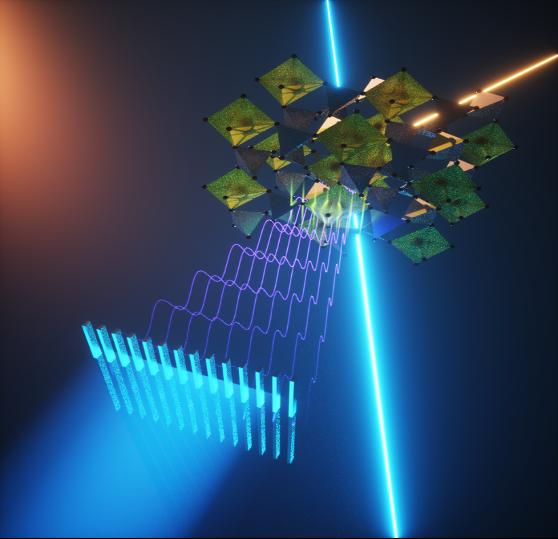
Credit: Ella Maru Studio (https://scientific-illustrations.com)
Transient grating spectroscopy is an elegant method that uses two laser pulses to activate a medium by creating an interference pattern made of parallel stripes of excitations that can be thermal, electronic, magnetic or even structural. The modulation depth of the pattern and its evolution can be measured by diffracting a third, time-delayed probe beam on the transient grating.
The modulation depth decays as the initial excitation propagates through the material. The distance between the stripes is determined by the wavelength of the pulses used to create the grating, which in the visible-ultraviolet part of the spectrum, is in the order of hundreds of nanometers.
Transient grating spectroscopy is a powerful tool for monitoring the transport properties of a material, be it heat, electric or magnetic flux, or structure. At a time of miniaturization of devices, the need to reach the regime of nanoscale transport is ever more pressing. Transport properties at the nanometer scale are completely unknown, and are expected to greatly differ from those at the micrometer or larger scales. This calls for the use of short wavelength radiation, and in particular X-rays. The main challenge is to cross two X-ray beams in order to generate a grating with nanometer step size.
Now, an international team of scientists have exploited the so-called Talbot effect to create the interference pattern with hard X-ray beams at a subnanometer wavelength (0.17 nm). The collaboration includes the LSU and LACUS (Majed Chergui) at EPFL, the PSI (Cris Svetina), the MIT (Keith Nelson), the FERMI free electron laser in Trieste (Claudio Masciovecchio), the Université Jean-Monnet-Saint-Étienne (Jérémy Rouxel), and the European Laboratory for Non-Linear Spectroscopy in Florence (Renato Torre), among others. The scientists used the Swiss X-ray Free Electron Laser (SwissFEL) at PSI.
The results are published in Nature Photonics, showing that the transient excitation grating decays in tens of femtoseconds to picoseconds, revealing the material’s phonon response. The researchers probed the grating using an optical pulse at 400 nm. This is the first demonstration of hard X-ray transient grating spectroscopy, which opens the way to exciting and novel developments.
“Hard X-ray transient grating is uniquely suited for investigating nanoscale transport phenomena in bulk and nanostructured materials, disordered materials, and even in liquids,” says Majed Chergui. “Future experiments can open the field to applications in the characterization of materials, especially for nano-electronics, nano-optics, and nano-magnetism.”
###
Funding
ERC Grant ‘DYNAMOX’ (ERC-2015-AdG-694097)
Swiss National Science Foundation via the NCCR:MUST
EU-H2020 Marie Sk?odowska-Curie Grant
Laserlab-Europe
US Department of Energy
Reference
Jérémy R. Rouxel, Danny Fainozzi, Roman Mankowsky, Benedikt Rösner, Gediminas Seniutinas, Riccardo Mincigrucci, Sara Catalini, Laura Foglia, Riccardo Cucini, Florian Döring, Adam Kubec, Frieder Koch, Filippo Bencivenga, Andre Al Haddad, Alessandro Gessini, Alexei A. Maznev, Claudio Cirelli, Simon Gerber, Bill Pedrini, Giulia F. Mancini, Elia Razzoli, Max Burian, Hiroki Ueda, Georgios Pamfilidis, Eugenio Ferrari, Yunpei Deng, Aldo Mozzanica, Philip J. M. Johnson, Dmitry Ozerov, Maria Grazia Izzo, Cettina Bottari, Christopher Arrell, Edwin James Divall, Serhane Zerdane, Mathias Sander, Gregor Knopp, Paul Beaud, Henrik Till Lemke, Chris J. Milne, Christian David, Renato Torre, Majed Chergui, Keith A. Nelson, Claudio Masciovecchio, Urs Staub, Luc Patthey, Cristian Svetina. Hard X-ray transient grating spectroscopy on bismuth germanate. Nature Photonics 22 April 2021. DOI: 10.1038/s41566-021-00797-9
Media Contact
Nik Papageorgiou
[email protected]
Related Journal Article
http://dx.




